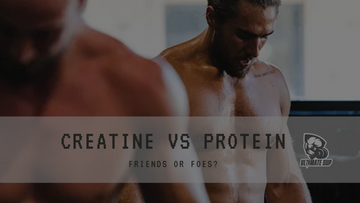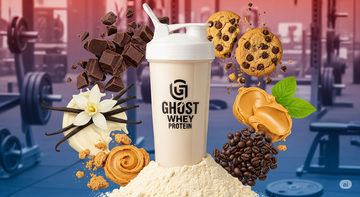To get a better choice between creatine vs whey, let's measure the gains and losses of each one with Ultimate Sup.
Have you ever been so confused with your massive supplement stack? It's not always appropriate to take as many ingredients as you can. The reason is that they may ruin other's usefulness. So, should you use many supplements simultaneously, especially protein supplements combined with creatine? Do they “get along” well? Or creatine vs whey, which one is better? Ultimate Sup will help you figure out the answer.
Table Of Contents
TL;DR Creatine vs Whey Protein
Bodybuilders use both whey protein and creatine for muscle building. Comparing them is a bit like comparing apples and oranges because they each serve a different purpose, but you can decide which will be more advantageous in a certain situation. Understanding benefits of creatine with whey, then how your body utilizes creatine and whey protein will help you determine which one you require more of to achieve your muscle-building goals.
Creatine: In A Nutshell
Creatine is derived from arginine, glycine, and methionine. It is an amino acid derivative produced by the kidneys, liver, and pancreas. It is retained in skeletal muscle tissue. When stored in biological cells, it is converted into phosphocreatine and preserved for later use. Some of the creatine is consumed through diet circulates as free creatine.
Creatine has become popular among the fitness community because it aids in muscle building. Scientific studies have shown that creatine boosts both muscle mass and strength. This same research found that athletes who used creatine supplements outperformed a control group by up to 43%. Creatine turns out to increase strength and performance.
Benefits Of Creatine
There are many benefits of creatine. Creatine is one of the most well-researched fitness supplements available, especially Creatine Monohydrate. Creatine's advantages are have been scientifically proven. There is a long list of benefits to using creatine as a workout supplement.
- Cells generate more energy. Creatine raises the level of phosphocreatine in your cells. Cellular phosphocreatine that has been stored increases the energy process at the cellular level. It aids in producing the molecule ATP, which is broken down during exercise to provide energy. ATP is the primary source of energy in our cells. Creatine creates and stimulates power at the most fundamental level.
- Creatine assists with muscle growth. Creatine stimulates the cellular processes that result in new muscle development. It also aids in the creation of complex proteins, which become muscle tissue.
- Creatine enhances high-intensity workout performance. It has been found in studies to boost endurance and stamina. Creatine's endurance-boosting properties are connected to support strength, fatigue resistance, increased muscular mass, faster recovery, and even increased brain performance.
- It improves brain function. Creatine Singapore delivers the same boost to your brain as muscle tissue because it increases the generation of the energy-producing chemical ATP at the cellular level. Creatine has been demonstrated to boost cognitive function. It can benefit the treatment of Alzheimer's and Parkinson's diseases. Creatine may also help prevent stroke and epilepsy.
Whey Protein: In A Nutshell
Whey protein is a common word for proteins extracted from whey. Whey is the liquid component of milk that is separated during the cheese-making process. Milk protein is made up of roughly 80% casein and 20% whey. The fatty ingredients in cheese are liquified, leaving the protein-rich liquid whey.
Whey protein powder can boost exercise and training performance. It provides all nine essential amino acids, which we must obtain from food. It also has a high amount of Branched-chain Amino Acids (BCAAs).
Benefits Of Whey Protein Powder
You can find many advantages to use whey protein. The reason is that there has been so much research on whey protein to back these benefits.
- It's a fantastic source of high-quality protein. It's highly digested, absorbed quickly, and has a high nutritional content.
- Whey protein contains branched-chain amino acids, which are instantly available for muscle protein synthesis. Leucine in high amounts promotes muscle development, repair, and regeneration.
- Whey protein reduces fat blood levels. According to one study, whey protein supplements can considerably lower the quantity of fat in the blood, resulting in good weight management.
- Protein powder lowers your blood pressure. Natural compounds found in dairy products have been shown in studies to reduce blood pressure. As whey protein is created, these molecules are transformed into lactokinins, which have been found to lower blood pressure in individuals with hypertension.
- It supports the fight against diabetes. Whey proteins have been demonstrated to both control blood sugar and improve natural insulin levels in the bloodstream. This is a two-fold advantage that combats Type 2 diabetes efficiently.

Creatine vs Whey Protein: The Differences
To find out which is better: creatine vs whey protein, let's look at their differences. The chemical composition of creatine and whey protein is the primary distinction between the two supplements. Creatine is a kind of amino acid. Because it is not a complete protein, it lacks all of the biochemical components required to make muscle proteins in the body. However, because it is a crucial chemical element of muscle protein synthesis, it helps gain muscle. You can see actual results from your training and workouts.
The hardest thing to do is calculating your creatine amount daily. You have to saturate your body over a few days or weeks to boost your phosphocreatine stores in the right way. You may follow the following protocols. Casual gym-goers and bodybuilders simply tend to take 3-5 grams of creatine daily. That's the most common. However, individuals who wish to reach their saturation point quickly will enhance the creatine intake, about 20-25 grams per day for the first week. Then, they can maintain the average creatine amount, around 5 grams daily.
Whey protein is an all-in-one protein. It can contribute to enhanced muscle growth since it provides all of the amino acids the body needs to create muscle and complete a variety of other metabolic tasks.
Whey protein must be digested and transformed into muscle protein components. It provides you with whatever you need to build lean muscle and get the most out of your workouts. The choice between creatine and whey protein is based on supplying amino acids to your body for protein synthesis. If you rely on creatine, you will need to offer another source of amino acids to the metabolic processes.
Is Creatine Better Than Whey Protein?
Creatine vs Whey Protein: Which one is better? It depends on your purposes. As a source of structural amino acids, protein provides various functions. Only under certain circumstances is the protein used. Creatine is exclusively for energy in high-intensity situations.
Can You Take Both Creatine And Whey Protein?
You can take these two supplements together. It makes no difference. You can even put a little creatine in your protein shake for better results. This combo, including protein and creatine, can push your protein macros along with maximizing your energy.
When To Take Creatine?
According to research, the optimal time to take creatine is just before or after your workout. This appears to be more effective than supplementing hours after exercise. In a ten-week study, researchers discovered that those who took creatine supplements just before or after practice gained significantly more muscle than those who took creatine supplements hours before or after training.
When To Take Whey Protein?
Whey protein supplements should be taken 16-60 minutes after exercise, according to conventional wisdom. This time is known as the anabolic window. It is the time when metabolic mechanisms are most efficient for turning protein into muscle protein synthesis. However, a recent study suggests that you take a whey protein supplement up to two hours after exercise or training to get the most out of it.
To conclude, whey protein powder and creatine are two common sports supplements that can build muscle mass and improve exercise performance. There are no better or worse. Instead, you should choose the one you need depending on your requirements. Just find your most suitable creatine supplement or whey protein powder right now at Ultimate Sup Singapore!
Related Articles:










